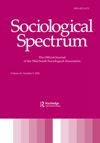看到联盟旗帜你有什么反应?按种族、族裔和地区检查公众反应
IF 1.1
3区 社会学
Q2 SOCIOLOGY
引用次数: 1
摘要
摘要本研究使用白人种族框架的视角,利用2011年和2015年的民意数据,考察种族、民族、地区和对观看邦联旗帜的反应之间的关联。数据来自皮尤研究中心(n = 3092)。调整后的多项logit模型的结果显示,与2011年相比,2015年美国成年人对看到邦联旗帜的反应平均更积极。积极反应的增加主要是由白人推动的,他们在2015年做出积极反应的几率比2011年增加了2倍。与美国黑人相比,白人更有可能对观看邦联旗帜做出积极反应,而拉丁裔受访者则不太可能对旗帜做出负面反应。对组内差异的进一步调查显示,2015年,前邦联州白人做出积极反应的调整概率增加了14%,前邦联盟以外的白人增加了8%。对占主导地位的白人种族框架的依赖通常会引起人们对邦联旗帜的积极反应,因为它象征着白人至上、反黑人,以及非历史和浪漫化的内战失败事业。本文章由计算机程序翻译,如有差异,请以英文原文为准。
How do you react to seeing the confederate flag? Examining public reactions by race-ethnicity and region
Abstract This study uses insights from the white racial frame perspective to examine associations among race-ethnicity, region, and reactions to viewing the Confederate flag using public opinion data from 2011 and 2015. Data come from pooled nationally representative cross-sectional surveys collected by the Pew Research Center (n = 3,092). Results from adjusted multinomial logit models showed that U.S. adults were on average more likely to react positively to seeing the Confederate flag in 2015 than in 2011. Increased positive responses were driven largely by whites whose odds of reacting positively in 2015 increased 2-fold relative to 2011. Compared with black Americans, whites were more likely to react positively to viewing the Confederate flag, and Latinx respondents were less likely to react negatively to the flag. Further inquiry into intragroup differences showed that the adjusted probability of reacting positively in 2015 increased by 14% for whites in former Confederate states and by 8% for whites outside the former Confederacy. Reliance on the dominant white racial frame typically invokes positive reactions to the Confederate flag because of its symbolism of white supremacy, antiblackness, and an ahistorical and romanticized Lost Cause of the civil war.
求助全文
通过发布文献求助,成功后即可免费获取论文全文。
去求助
来源期刊

Sociological Spectrum
SOCIOLOGY-
CiteScore
3.80
自引率
5.60%
发文量
16
期刊介绍:
Sociological Spectrum publishes papers on theoretical, methodological, quantitative and qualitative research, and applied research in areas of sociology, social psychology, anthropology, and political science.
 求助内容:
求助内容: 应助结果提醒方式:
应助结果提醒方式:


